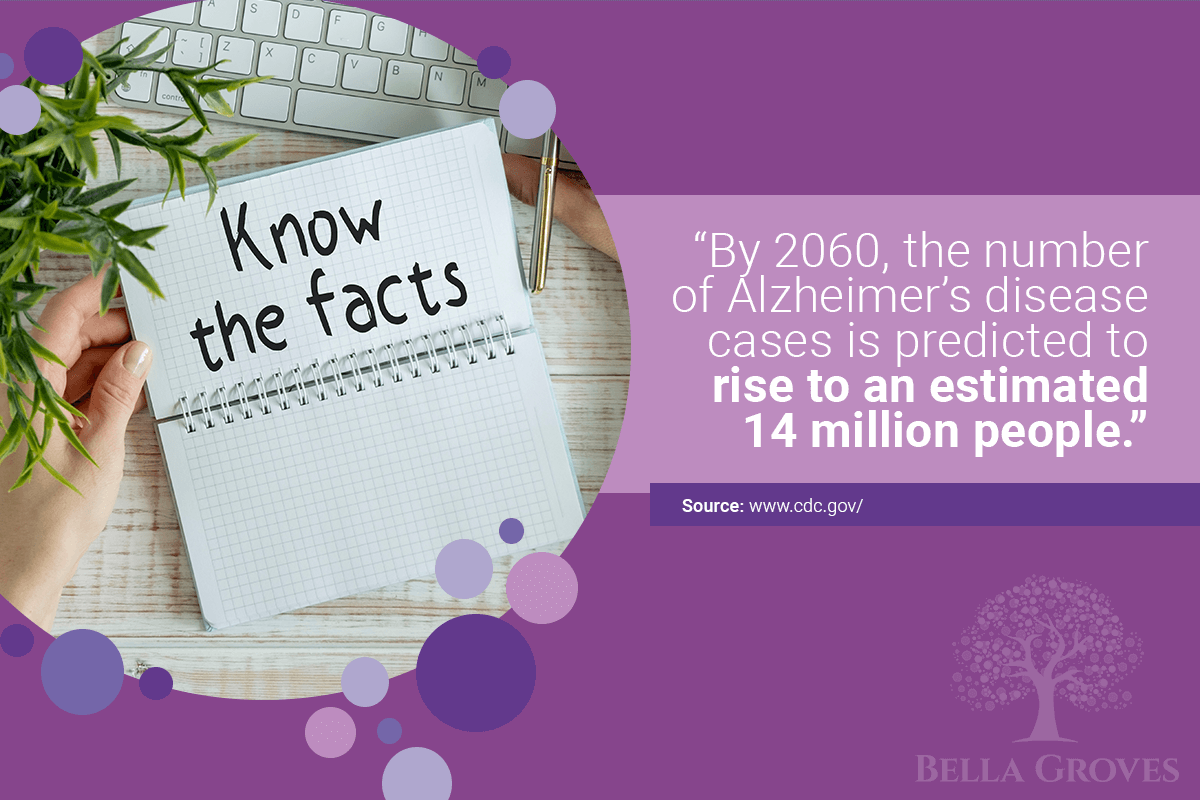
Facts and Figures: The Impact of Dementia
When someone you love receives a dementia diagnosis, the first step you should take is to educate yourself on dementia to better understand what to expect in your family’s journey. It’s the best way to stay proactive and discover the tools and resources available that can help you provide or seek the best possible care and support for your family.
However, dementia education goes much further than medical information or caregiver support. You also want to explore the facts and figures that surround dementia and the impact it has around the world.
At Bella Groves, it’s our mission to bridge the gap between dementia education and compassionate memory care. Only through empathy, understanding, and research can we come together to combat dementia and create a positive future for those impacted by it.
We’re highlighting some of the most prominent facts and figures behind dementia to help you understand its impact.
Dementia on a National and Global Scale
Dementia is an umbrella term that describes symptoms associated with cognitive impairment impacting memory, language, and problem-solving. As dementia progresses, neurons in the brain become damaged; these neurons are essential to thinking, walking, talking, and all human activity.
- Currently, over 55 million people globally are living with a form of dementia, and that number is estimated to rise to nearly 140 million by the year 2050.
- Alzheimer’s disease is the most prominent form of dementia, responsible for 60-80% of cases.
Age
As we age, our brains change; however, dementia is not an inevitable part of aging. In fact, up to 40% of dementia cases may be prevented or delayed.
However, a person’s risk of developing dementia does increase with age, as does the number of people diagnosed.
- 5% of adults between the ages of 65 to 74 have been diagnosed with dementia.
- Over 13% of people between the ages of 75 to 84 have been diagnosed with dementia.
- 33% of those over the age of 85 have been diagnosed with dementia.
As the baby boomer generation grows older, the number of people in the United States living with dementia will significantly grow.
Family History and Genetics
Family history can increase the risk of developing dementia in specific cases, but that doesn’t mean that families pass down a gene that directly causes dementia. Rather, some inherited genes can increase an individual’s risk of developing dementia.
The type of dementia that is passed down is called familial Alzheimer’s disease (FAD), and less than 1% of all dementia cases are caused by this inherited gene. That being said, a parent with FAD has a 50% chance of passing it to their children.
The risk of developing dementia due to family history is higher if you have:
- A parent who developed dementia
- A sibling who developed dementia
- A family member who developed dementia when they were younger than 60
Financial Impact
Each country has a ranking in terms of economy; for example, the United States is ranked number 1 as the world’s largest economy. If dementia were a country, it would be ranked as the world’s 14th-largest economy.
The global cost of dementia is estimated to be a little over $1.3 trillion dollars, and the progressive nature of dementia contributes to a major economic weight on individuals, families, and the structure of the healthcare system.
In 2022 alone, the estimated healthcare costs associated with dementia were around $321 billion, which is estimated to exceed $1 trillion by 2050.
Of course, these projections are based on direct healthcare costs and are likely underestimated because indirect costs associated with dementia, such as family caregivers, are usually not included. To put that in perspective, in 2022, it was estimated that informal caregivers provided nearly 18 billion hours of care, valued at $339.5 billion.
Emotional Impact
It’s hard to put a percentage on the emotional impact of dementia. How can anyone turn the feelings of grief, anger, exhaustion, and even isolation into a statistic? Each individual’s journey with dementia is unique, and no two people will have the same experience.
However, when it comes to the impact of dementia on caregivers and family members, many polls and studies have been conducted to at least try to estimate the general feelings associated with a dementia diagnosis.
- 35% of caregivers across the world said they have hidden a family member’s dementia diagnosis (likely due to the stigma and lack of education by those not impacted).
- Over 50% of caregivers around the world have experienced personal health issues as a result of their responsibilities, even when many of those studied expressed positive sentiments about their role.
For family members and caregivers, dementia can be challenging to manage, both emotionally and financially. At the community level, dementia can have significant economic impacts. The cost of caring for those living with dementia is expected to increase, placing an even greater load on healthcare systems and economies worldwide.
When it comes to dementia, you are not alone. Dementia has a significant impact across the world, and support is available. No matter where you are in your own journey with dementia, Bella Groves is here for you.
We invite you to visit our website to learn more about our mission, services, and support.


